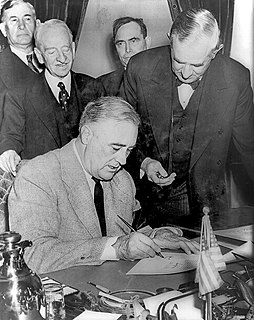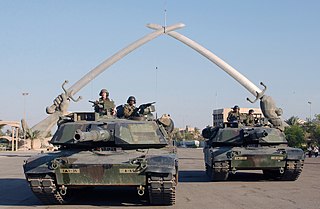Related Research Articles

The Iraq disarmament crisis was claimed as one of primary issues that led to the multinational invasion of Iraq on 20 March 2003. Since the 1980s, Iraq was widely assumed to have been producing and extensively running the programs of biological, chemical and nuclear weapons. Iraq made extensive use of chemical weapons during the Iran–Iraq War in the 1980s, including against its own Kurdish population. France and the Soviet Union assisted Iraq in the development of its nuclear program, but its primary facility was destroyed by Israel in 1981 in a surprise air strike.

United Nations Security Council Resolution 1441 is a United Nations Security Council resolution adopted unanimously by the United Nations Security Council on 8 November 2002, offering Iraq under Saddam Hussein "a final opportunity to comply with its disarmament obligations" that had been set out in several previous resolutions. It provided a justification for the subsequent US invasion of Iraq.

Iraq actively researched and later employed weapons of mass destruction (WMD) from 1962 to 1991, when it destroyed its chemical weapons stockpile and halted its biological and nuclear weapon programs as required by the United Nations Security Council. The fifth President of Iraq, Saddam Hussein, was internationally condemned for his use of chemical weapons during the 1980s campaign against Iranian and Kurdish civilians during and after the Iran–Iraq War. In the 1980s, Saddam pursued an extensive biological weapons program and a nuclear weapons program, though no nuclear bomb was built. After the Persian Gulf War (1990–1991), the United Nations located and destroyed large quantities of Iraqi chemical weapons and related equipment and materials; Iraq ceased its chemical, biological and nuclear programs.

United Nations Special Commission (UNSCOM) was an inspection regime created by the United Nations to ensure Iraq's compliance with policies concerning Iraqi production and use of weapons of mass destruction after the Gulf War. Between 1991 and 1997 its director was Rolf Ekéus; from 1997 to 1999 its director was Richard Butler.

This article describes the positions of world governments before the actual initiation of the 2003 invasion of Iraq, and not their current positions as they may have changed since then.

Significant opposition to the Iraq War occurred worldwide, both before and during the initial 2003 invasion of Iraq by a United States-led coalition, and throughout the subsequent occupation. People and groups opposing the war include the governments of many nations which did not take part in the invasion, and significant sections of the populace in those that did.

In March 2003 the United States government announced that "diplomacy has failed" and that it would proceed with a "coalition of the willing" to rid Iraq under Saddam Hussein of weapons of mass destruction the US and UK insisted it possessed. The 2003 invasion of Iraq began a few days later.

The 2003 invasion of Iraq was the first stage of the Iraq War. The invasion phase began on 19 March 2003 (air) and 20 March 2003 (ground) and lasted just over one month, including 26 days of major combat operations, in which a combined force of troops from the United States, the United Kingdom, Australia and Poland invaded Iraq. The capital city of Baghdad was captured by Coalition forces on April 9, 2003 after the six day long Battle of Baghdad. This early stage of the war formally ended on 1 May 2003 when U.S. President George W. Bush declared the "end of major combat operations" in his Mission Accomplished speech, after which the Coalition Provisional Authority (CPA) was established as the first of several successive transitional governments leading up to the first Iraqi parliamentary election in January 2005. U.S. military forces later remained in Iraq until the withdrawal in 2011.

The 1998 bombing of Iraq was a major four-day bombing campaign on Iraqi targets from 16 to 19 December 1998, by the United States and the United Kingdom. The contemporaneous justification for the strikes was Iraq's failure to comply with United Nations Security Council resolutions and its interference with United Nations Special Commission inspectors who were looking for weapons of mass destruction.

A declaration of war is a formal act by which one state announces existing or impending war activity against another. The declaration is a performative speech act by an authorized party of a national government, in order to create a state of war between two or more states.

The Authorization for Use of Military Force Against Iraq Resolution of 2002, informally known as the Iraq Resolution, is a joint resolution passed by the United States Congress in October 2002 as Public Law No. 107-243, authorizing the use of the United States Armed Forces against Saddam Hussein's Iraq government in what would be known as Operation Iraqi Freedom.

Sir Jeremy Quentin Greenstock is a British retired diplomat, active from 1969 to 2004.
The following lists events in the year 2003 in Iraq.

The rationale for the Iraq War, both the 2003 invasion of Iraq and the subsequent hostilities, was controversial because the George W. Bush administration began actively pressing for military intervention in Iraq in late 2001. The primary rationalization for the Iraq War was articulated by a joint resolution of the United States Congress known as the Iraq Resolution.

A dispute exists over the legitimacy of the 2003 invasion of Iraq. The debate centers around the question whether the invasion was an unprovoked assault on an independent country that may have breached international law, or if the United Nations Security Council authorized the invasion. Those arguing for its legitimacy often point to Congressional Joint Resolution 114 and UN Security Council resolutions, such as Resolution 1441 and Resolution 678. Those arguing against its legitimacy also cite some of the same sources, stating they do not actually permit war but instead lay out conditions that must be met before war can be declared. Furthermore, the Security Council may only authorise the use of force against an "aggressor" in the interests of preserving peace, whereas the 2003 invasion of Iraq was not provoked by any aggressive military action.

The Iraq War was a protracted armed conflict in Iraq from 2003 to 2011 that began with the invasion of Iraq by the United States–led coalition which overthrew the Iraqi government of Saddam Hussein. The conflict continued for much of the next decade as an insurgency emerged to oppose the coalition forces and the post-invasion Iraqi government. An estimated 151,000 to 1,033,000 Iraqis died in the first three to five years of conflict. US troops were officially withdrawn in 2011. The United States became re-involved in 2014 at the head of a new coalition, and the insurgency and many dimensions of the armed conflict continue today. The invasion occurred as part of the George W. Bush administration's War on Terror following the September 11 attacks, despite there being no connection between the attacks and Iraq.
The 2003 United States–British–Spanish Draft Resolution on Iraq was, according to Ambassador John Negroponte, "a resolution to have the Council decide that Iraq is not complying, is out of compliance, with Resolution 1441". Initially introduced on February 24, 2003 and amended on March 7, 2003, the draft set a March 17 deadline for Iraq to demonstrate "full, unconditional, immediate and active cooperation in accordance with its disarmament obligations." The draft was based on information from the Iraqi defector "Curveball," who claimed Saddam Hussein was in possession of weapons of mass destruction, which Curveball later admitted was untrue. The widely discussed UN resolution was not brought up for formal vote after it became clear that it would not have passed due to opposition from France, Russia, and China. The United States invaded Iraq without UN support on March 20, 2003, initiating the Iraq War.

The 2003 invasion of Iraq by the United States, United Kingdom, Australia, Poland and a coalition of other countries was widely viewed as a violation of the United Nations Charter, the bedrock of international relations in the post-World War II world. The then United Nations Secretary-General Kofi Annan stated in September 2004 that: "I have indicated it was not in conformity with the UN charter. From our point of view and the UN Charter point of view, it [the war] was illegal".
References
- ↑ 10 Days to War - episode guide, BBC.
- ↑ 10 Days to War credits, BBC.